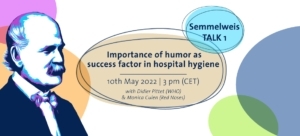This was our fourth Semmelweis Talk: The influence of COVID-19 on MDRO´s & infection control
This time we were privileged to welcome Andreas Voss, Professor and Chair of the department of clinical microbiology and infection control at the University Medical Center in Groningen, Emese Szilagyi, medical director at Péterfy Hospital in Budapest, and last but not least Jakub Kozák, CEO and co-founder of Datlowe.
The Influence of COVID-19 on MDRO’s & Infection Control
Andreas Voss gave us a very detailed overview of the changes caused by Covid-19, focusing on infection and prevention control. IPC suddenly had the attention of almost everyone. Another change was that public health services basically swallowed up infection control capacity.
Of course, this also raised the question whether the pandemic has also facilitated positive changes. The answer is yes and no.
The protection of the healthcare workers themselves became an important motivator to follow IPC guidelines and when scarcity hit healthcare, all rules and habits changed immediately.
But new opportunities have also emerged: The number of MDRO´s dropped drastically with the beginning of the pandemic and there was hardly any influenza activity in 2021 because of the Covid-19 measures.
IPC learnings from the field
Emese Szilagyi gave us a lively insight into her IPC learnings and experiences from the field. Infection control was extremely overloaded at peak times and it was almost impossible to do a good job. The lack of well-trained healthcare workers and contamination from equipment further complicated the situation.
Luckily, the situation has returned to normal in the meantime, but there is still a shortage of staff. To get more people interested in healthcare jobs, Szilagyi proposes to start advertising in schools already.
HAIDI –AI-based solution for the automation of surveillance of healthcare-associated infections
Jakub Kozák presented his new AI-based solution for automating the surveillance of healthcare-associated infections named HAIDI, which will help hospitals to leverage the power of data hidden in their information systems.
HAIDI detects all major types of HAIs and works for all departments. The software is available in Czech, Slovak, German and English. Up to now HAIDI has been successfully deployed in 18 Hospitals in the Czech Republic, Slovakia and Austria and takes care of 8.500 beds in total.
But how does it work?
HAIDI collects all available sources of information, such as X-ray descriptions or care documents, analyses them and finally converts them into an automated list of potential HAIs.
The AI-based solution has the great advantage of being extremely time saving as it will reduce the time spent on HAI case detection from about 40 hours to 20 hours per month.
In addition to the individual presentations, many exciting questions were answered and discussed. If you want to find outmore, have a look at the detailed video about the fourth Semmelweis Talk!
Our special thanks go above all to our contributors:
- Andreas Voss
- Emese Szilagyi
- Jakub Kozák




